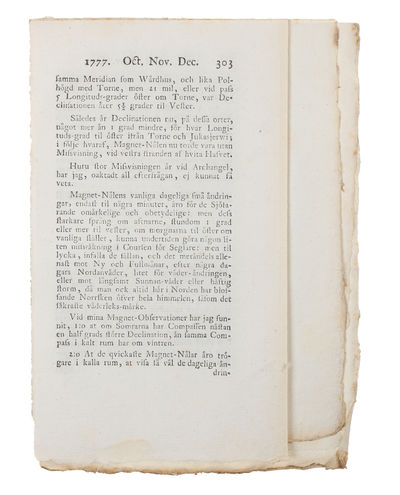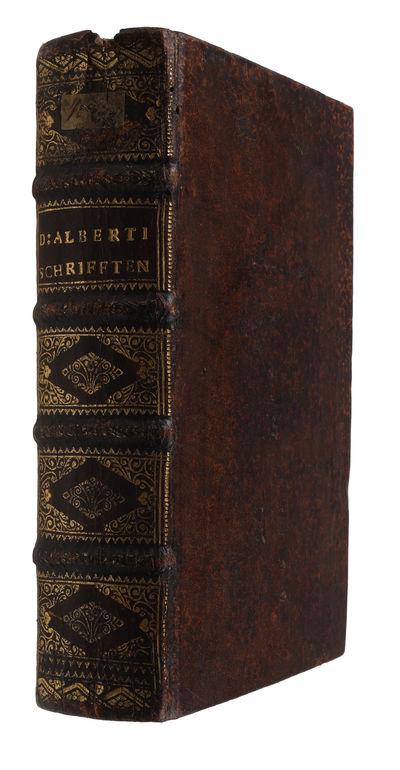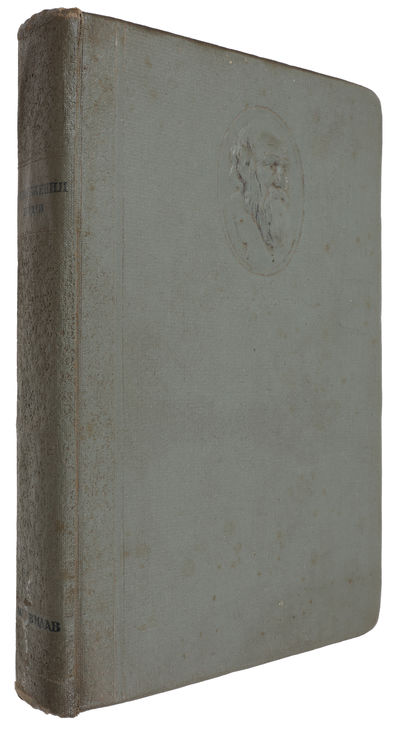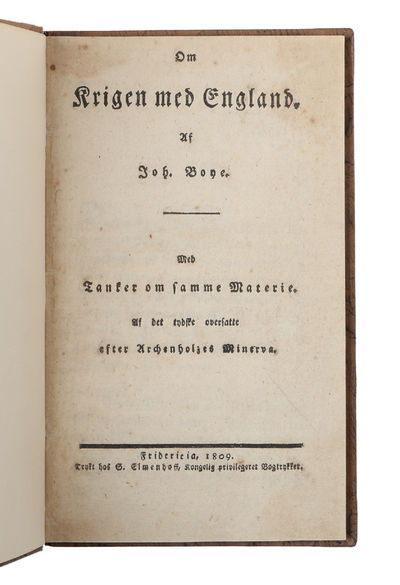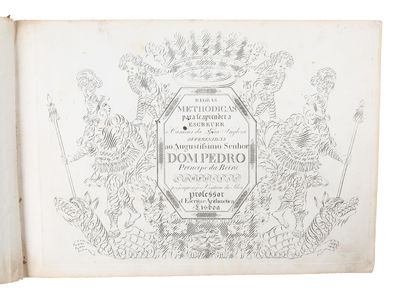MARX, CARLOS [KARL] (+) GABRIELLE DEVILLE (+) [Translator:] ALBANO DE MORAES.
O Capital. (i.e. Portuguese: "Das Kapital"). - [FIRST PORTUGUESE EDITION OF THE MOST IMPORTANT ABRIDGED VERSION OF "THE CAPITAL"]
Herman H. J. Lynge & Søn A/S
lyn62679
Lisboa, De Francisco Luiz Goncalves, 1912. 8vo. In the original red printed cloth-binding with black and white lettering. Spine with loss of the white lettering. Paper-label pasted on to lower inner margin of front board. Very light wear to extremities, Internally very fine and clean. 240 pp.
The exceedingly scarce first Portuguese edition of the most important abridged version of Marx's Capital ever to have appeared, published fifty-six years before the first full Portuguese (but published in Brazil) translation and whole sixy-two years before the first full translation published in Portugal. Curiously, two translations of the present work were made 1912 but the present translation seems to have priority (see Bastien, "Readings and Translations of Karl Marx in Portugal"). After the 1933 rise of Salazar's dictatorial Estado Novo regime, suppression of the relatively newly founded Communist party grew. Members were arrested, tortured, and executed and many were sent to the Tarrafal concentration camp in the Cape Verde Islands. Communist literature suffered an equally repressive fate, hence the rarity of the present work. Marxism and especially Marxist writing caught on comparatively late in Portugal: "As for the Socialist Party - supposed to be the main expression of Marxism -, it revealed itself unable to stimulate effective theoretical and doctrinal efforts. Its existence was an example of ambiguity and inconsequence. Its political programme went on mixing Marxian elements, associationist tradition and positivist thinking. Its strategy balanced continuously between an alliance with republican politicians and the maintenance of political autonomy. Its tatics balanced between electoral abstencionism and an involvement in election processes, that never led it to a relevant position in parliament. Even its international relations showed a lasting ambiguity: it had been created according to the instructions of the Marxist majority at the Hague Congress, when most of its members tended to support political abstencionism. When the formation of the Second lnternacional was taking place in Paris in 1889 Portuguese socialists tried to join the Marxist congress, after being present at the possibilist congress. In 1920 they decided to join the Third lnternacional (what was not accomplished), at the same time that an internal reformist turn was taking place." (Bastien, "Readings and Translations of Karl Marx in Portugal"). "The epitome, here translated, was published in Paris, in 1883, by Gabriel Deville, possibly the most brilliant writer among the French Marxians. It is the most successful attempt yet made to popularize Marx's scientific economics. It is by no means free from difficulties, for the subject is essentially a complex and difficult subject, but there are no difficulties that reasonable attention and patience will not enable the average reader to overcome. There is no attempt at originality. The very words in most cases are Marx's own words, and Capital is followed so closely that the first twenty-five chapters correspond in subject and treatment with the first twenty-five chapters of Capital. Chapter XXVI corresponds in the main with Chapter XXVI of Capital, but also contains portions of chapter XXX. The last three chapters-XXVII, XXVIII, and XXIX-correspond to the last three chapters-XXXI, XXXII, and XXXIII-of Capital." (ROBERT RIVES LA MONTE, Intruductory Note to the 1899 English translation). Capital de Marx also had a Portuguese edition at this time, or better, two different editions, both in 1912, but only in translation of the survey of Book I published in France by Gabriel Deville in 1883 (Marx, 1912a and Marx, 1912b). This version omitted material dealt with in at least four chapters of the original text and was not particularly appreciated by Engels. It was a simplified text, aimed at supporting the training of socialist militants and that made it possible for them to have access, indirect, to the work of Marx. The other summaries and anthologies of Capital, which, with a purpose similar to that of Deville, circulated in Europe during this period or ignored in Portugal, as was the case with Carlo Cafiero, or were only occasionally mentioned, as was the case with Paul Lafargue and Karl Kautsky, in its French versions. OCLC list two copies, both in the US.
The exceedingly scarce first Portuguese edition of the most important abridged version of Marx's Capital ever to have appeared, published fifty-six years before the first full Portuguese (but published in Brazil) translation and whole sixy-two years before the first full translation published in Portugal. Curiously, two translations of the present work were made 1912 but the present translation seems to have priority (see Bastien, "Readings and Translations of Karl Marx in Portugal"). After the 1933 rise of Salazar's dictatorial Estado Novo regime, suppression of the relatively newly founded Communist party grew. Members were arrested, tortured, and executed and many were sent to the Tarrafal concentration camp in the Cape Verde Islands. Communist literature suffered an equally repressive fate, hence the rarity of the present work. Marxism and especially Marxist writing caught on comparatively late in Portugal: "As for the Socialist Party - supposed to be the main expression of Marxism -, it revealed itself unable to stimulate effective theoretical and doctrinal efforts. Its existence was an example of ambiguity and inconsequence. Its political programme went on mixing Marxian elements, associationist tradition and positivist thinking. Its strategy balanced continuously between an alliance with republican politicians and the maintenance of political autonomy. Its tatics balanced between electoral abstencionism and an involvement in election processes, that never led it to a relevant position in parliament. Even its international relations showed a lasting ambiguity: it had been created according to the instructions of the Marxist majority at the Hague Congress, when most of its members tended to support political abstencionism. When the formation of the Second lnternacional was taking place in Paris in 1889 Portuguese socialists tried to join the Marxist congress, after being present at the possibilist congress. In 1920 they decided to join the Third lnternacional (what was not accomplished), at the same time that an internal reformist turn was taking place." (Bastien, "Readings and Translations of Karl Marx in Portugal"). "The epitome, here translated, was published in Paris, in 1883, by Gabriel Deville, possibly the most brilliant writer among the French Marxians. It is the most successful attempt yet made to popularize Marx's scientific economics. It is by no means free from difficulties, for the subject is essentially a complex and difficult subject, but there are no difficulties that reasonable attention and patience will not enable the average reader to overcome. There is no attempt at originality. The very words in most cases are Marx's own words, and Capital is followed so closely that the first twenty-five chapters correspond in subject and treatment with the first twenty-five chapters of Capital. Chapter XXVI corresponds in the main with Chapter XXVI of Capital, but also contains portions of chapter XXX. The last three chapters-XXVII, XXVIII, and XXIX-correspond to the last three chapters-XXXI, XXXII, and XXXIII-of Capital." (ROBERT RIVES LA MONTE, Intruductory Note to the 1899 English translation). Capital de Marx also had a Portuguese edition at this time, or better, two different editions, both in 1912, but only in translation of the survey of Book I published in France by Gabriel Deville in 1883 (Marx, 1912a and Marx, 1912b). This version omitted material dealt with in at least four chapters of the original text and was not particularly appreciated by Engels. It was a simplified text, aimed at supporting the training of socialist militants and that made it possible for them to have access, indirect, to the work of Marx. The other summaries and anthologies of Capital, which, with a purpose similar to that of Deville, circulated in Europe during this period or ignored in Portugal, as was the case with Carlo Cafiero, or were only occasionally mentioned, as was the case with Paul Lafargue and Karl Kautsky, in its French versions. OCLC list two copies, both in the US.
Adresse:
Silkegade 11
DK-1113 Copenhagen Denmark
Telefon:
CVR/VAT:
DK 16 89 50 16
E-post:
Nettsted:
![O Capital. (i.e. Portuguese: "Das Kapital"). - [FIRST PORTUGUESE EDITION OF THE MOST IMPORTANT ABRIDGED VERSION OF "THE CAPITAL"] (photo 1)](https://d3525k1ryd2155.cloudfront.net/h/847/095/1702095847.0.l.jpg)
![O Capital. (i.e. Portuguese: "Das Kapital"). - [FIRST PORTUGUESE EDITION OF THE MOST IMPORTANT ABRIDGED VERSION OF "THE CAPITAL"] (photo 2)](https://d3525k1ryd2155.cloudfront.net/h/847/095/1702095847.1.l.jpg)
![O Capital. (i.e. Portuguese: "Das Kapital"). - [FIRST PORTUGUESE EDITION OF THE MOST IMPORTANT ABRIDGED VERSION OF "THE CAPITAL"] (photo 3)](https://d3525k1ryd2155.cloudfront.net/h/847/095/1702095847.2.l.jpg)
![O Capital. (i.e. Portuguese: "Das Kapital"). - [FIRST PORTUGUESE EDITION OF THE MOST IMPORTANT ABRIDGED VERSION OF "THE CAPITAL"] (photo 4)](https://d3525k1ryd2155.cloudfront.net/h/847/095/1702095847.3.l.jpg)
